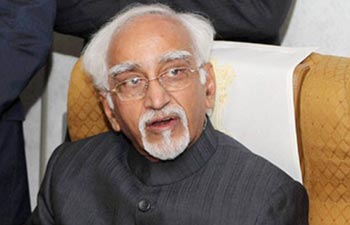
On International Human Rights Day, Indian Vice president Hamid Ansari Tuesday said nature and extent of violations are a cause of concern.
New Delhi, Dec 10/Nationalturk -: Admitting that human rights violations are widespread, Indian Vice president Hamid Ansari Tuesday said nature and extent of violations are a cause of concern.
“As we mark International Human Rights Day today, we need to introspect on some human rights matters affecting our citizens. We take pride, with justice, in the fact that we have put in place the requisite intellectual, legal and institutional framework for protection and promotion of human rights as a national responsibility,” Ansari said while addressing a function organized by the India’s National Human Rights Commission (NHRC).
‘Violations are wide spread’
He said violations are widespread. “Discrimination based on religion, caste, language, ethnicity, creed, work, descent and economic status continue to occur with disturbing frequency. These violations relate to denial of rights by State agencies, by individuals and groups. The weaker party is the invariable victim”.
Ansari said the nature and extent of violations are a cause of concern.
“There is a gap between what the official agencies project and what is perceived to be the situation on the ground. As a robust and vibrant democracy we are guided by our Constitution and the principles, rights and duties enunciated therein. We are also bound by our international commitments,” he said.
‘Intl humanitarian law and its provisions find strong echo in Indian constitutional principles’
Ansari said International Humanitarian Law and its provisions find a strong echo in Indian constitutional principles.
“Human Rights as they are currently deliberated upon internationally remain primarily and unavoidably part of an intergovernmental process with inputs of varying degree from civil societies, academia and voluntary organizations. It is essentially a top-down process with legally constituted Governments and their institutions primarily responsible for promotion and protection of human rights within their own sovereign jurisdiction. By the same logic, it often becomes a politicized activity and the HR Institutions nationally and internationally come under pressure to endorse politically conditioned outcomes. As a result universal principles tend to be invoked, or overlooked, selectively,” he said.
The Indian vice president said the malaise is widespread and the record of both the Cold War and the post-Cold War periods in all parts of the world testifies to it
“The beneficiaries of human rights are individuals who live in sovereign states that together constitute the community of nations. This is not a community of equals and exists with more than one disjuncture pertaining to their capacity to influence matters. The interests of individuals therefore often get subordinated to the interests of nations. The intent of the Charter and of the Universal Declaration is thus subsumed in the structural framework of the international community. It does not stand alone,” he added.
Write your comments and thoughts below
Faiz Ahmad / NationalTurk India News

